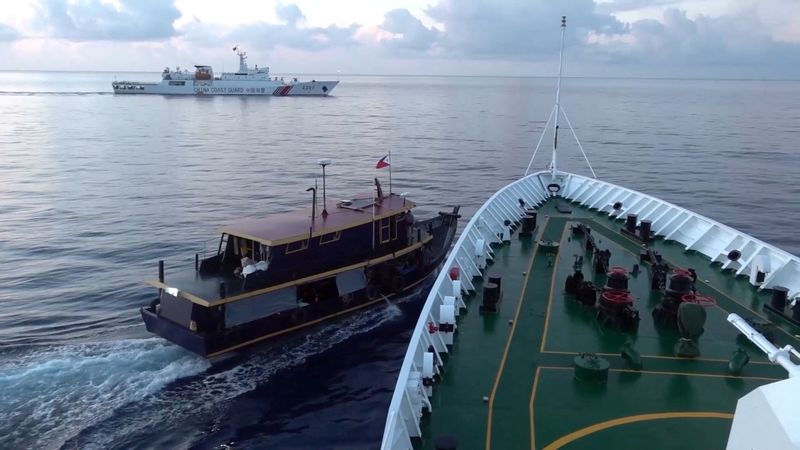By Enrico Dela Cruz and Karen Lema
MANILA (Reuters) -The Philippines on Monday accused Chinese coastguard vessels of "intentionally" colliding with its vessels on a resupply mission in a disputed part of the South China Sea, as ties deteriorated between the Southeast Asian U.S. ally and Beijing.
Both sides traded accusations after the latest incident on Sunday, which was the most serious yet in the waters around the disputed Second Thomas shoal, though no one was harmed.
China said on Sunday that the Philippine boats "bumped dangerously" with the coastguard vessels and "Chinese fishing vessels" fishing there.
On Monday, China's embassy in Manila said it had lodged stern representations to the Philippines over its vessels "trespassing", and called on the Philippines government to stop "causing trouble and provocation" at sea and to stop smearing China's reputation with "groundless attacks".
Officials from the Philippine national security council, coastguard, foreign ministry, defence ministry and armed forces condemned the actions of the Chinese coastguard.
Siding with its ally, the United States formally expressed concern in a statement that China's foreign ministry said ignored the facts.
U.S. national security adviser Jake Sullivan, in a call with his Philippine counterpart Eduardo Ano on Monday, reiterated U.S. support for Manila following the incident, calling the Chinese maritime actions "dangerous and unlawful," according to the White House.
Philippines Defense Secretary Gilberto Teodoro said during a news conference that "Chinese Coast Guard and maritime militia vessels, in blatant violation of international law, harassed and intentionally hit" Manila's supply boat and coastguard ship.
"This is a serious escalation of the illegal activities conducted by the Chinese government in the West Philippine Sea in complete disregard of any norm or convention of international law," Teodoro said after attending a security meeting called by President Ferdinand Marcos Jr.
Teodoro also acknowledged "the support of our allies and like-minded nations such as the United States, Japan, Australia, Germany, Canada, the Netherlands, the United Kingdom and European Union in condemning China’s aggression and expansionist actions."
He said the foreign ministry had summoned Chinese Ambassador Huang Xilian to "condemn the reckless and illegal act of the Chinese government."
Since Marcos came to power in 2022, the Philippines has sought closer ties with its traditional ally, the United States, while lodging increasing complaints about China's aggressive behaviour.
In contrast to the more pro-China stance taken by the previous administration, Marcos' government has filed 122 diplomatic protests against China's aggressive actions in the South China Sea.
Those incidents included attempts to block Philippines resupply missions and use of water cannon on Aug. 5
The regular resupply missions are for a handful of Philippine troops living aboard an aging warship that was deliberately run aground on the Second Thomas Shoal in 1999 to assert Manila's sovereignty claims.
The uninhabited shoal, known in Manila as Ayungin and Renai Reef in China, is within the Philippines' 200-nautical-mile exclusive economic zone, and is strategically located on one of the world's busiest trade routes.
Medel Aguilar, the Philippines military' spokesperson, said Sunday's incident was the first time that Chinese vessels had resorted to colliding with resupply boats.
One image from Sunday shared by the Philippine coast guard showed three of four boats involved in the resupply mission being surrounded by seven bigger Chinese coast guard and maritime militia vessels.
China on Sunday described the actions taken by its coastguard vessels as "professional and restrained" and said the Philippine vessels had "intruded in the waters of Renai."

Teodoro said "China has no jurisdiction or authority or right to conduct any operations whatsoever" in the Philippines exclusive economic zone.
The Permanent Court of Arbitration in The Hague concluded in 2016 that Beijing's expansive claim to the South China Sea was groundless. China maintains it does not accept any claim or action based on the ruling.